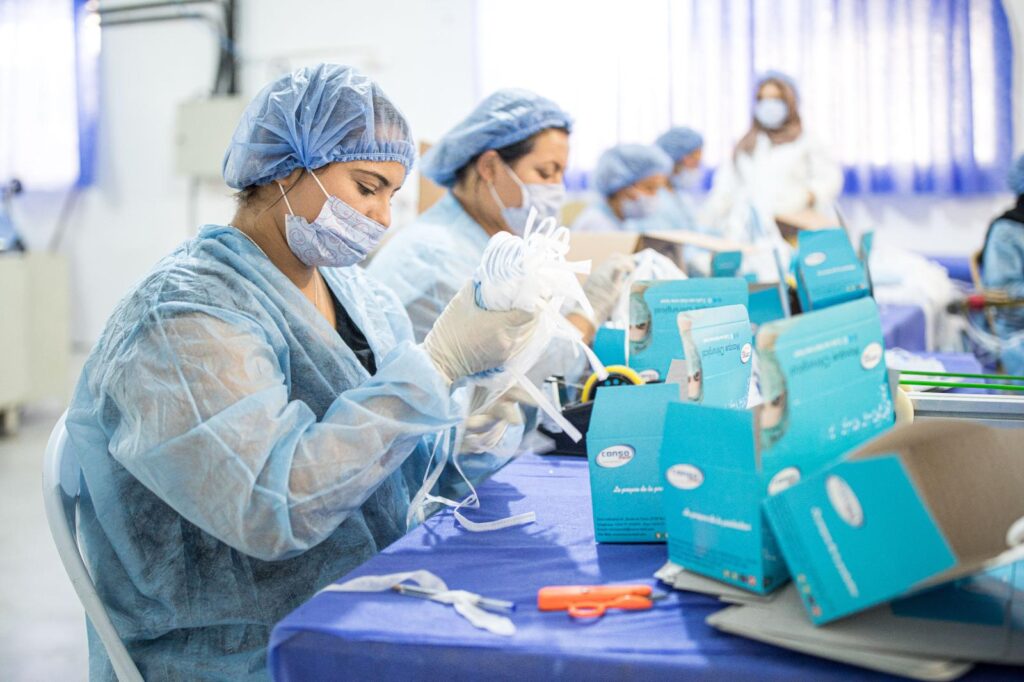ADF STAFF
When the COVID-19 pandemic hit Tunisia, more than 100 workers at a factory that produces protective gear for medical workers isolated themselves around the clock at work to continue their essential labor.
The 5,000-square-meter factory, Consomed, has become one of the country’s leading producers of such items since it opened a decade ago in rural Kairouan.
“We stayed for 43 days continuously in the factory without going out, as we had to stay focused to deliver the increasing demands,” factory director Hamza Alouini recently told the U.S. Agency for International Development (USAID). “We used to just fill the needs of the hospitals, but during this period of COVID-19, we started to receive other demands from different sectors, such as the military, the Ministry of the Interior, the Department of Civil Protection and all the individuals who are in direct contact with infected people.
“In order to guarantee the protection of these individuals, we had to work nonstop.”
As worldwide demand for materials needed to produce protective overalls, blouses, caps, overshoes and disposable caps led to price increases, Consomed struggled to continue production.
That’s when USAID offered Consomed a grant through the Tunisia JOBS (Jobs, Opportunity, Business and Success) program.
The grant allowed the factory to continue production and “avoid importing products that can be manufactured here in Tunisia,” Alouini said.
The U.S. also approved a Tunisia JOBS grant at Kairouan’s bustling Medica-Hitex facility, where workers precisely measure and cut wide strands of blue fabric pulled from large reams. Other workers stitch the material together to make an array of products for medical workers and others affected by COVID-19.
Founded in 2016, Medica-Hitex typically specializes in producing surgical draping, single-use medical wipes and medical wipes used in operating rooms. But the pandemic has spurred the company to produce medical gowns for COVID-19 patients and their hospital visitors.
“We also added standard gowns, especially for doctors and all the medical staff,” Montassar Ben Meddeb, chief pharmacist and general manager of Medica-Hitex, told USAID staff in Tunisia. Although demand for those products increased, so did the cost of materials needed to produce them. Through the Tunisia JOBS grant, the company was able to buy the material it lacked and expand its workforce from 80 to 120 employees.
“In this short period of time we have been able to increase the number of our clients, such as charitable organizations that help the Tunisian people in the war against COVID-19,” Meddeb said. “We also think we are ready in case of a second wave” of the virus.
Other virus-related U.S. contributions to Tunisia include the donation of sanitation kits for municipal trash collectors and janitors in nearly half of the country’s 350 municipalities, the purchase of more than 3 million liters of bleach and disinfectants, and $1.5 million in cleaning equipment and materials, allowing hospitals to safely handle casualties.
The U.S. Embassy in Tunisia also helped the country launch www.sa7ti.tn, a free online platform that trains health care workers to protect themselves as they care for those with COVID-19.
The first case of COVID-19 was confirmed in Tunisia in early March. the patient was a Tunisian national who recently had traveled to Italy. The virus since has infected more than 1,600 Tunisians and killed more than 50.

